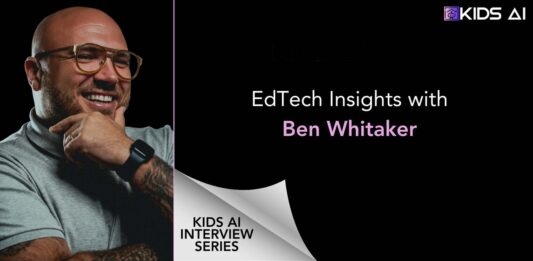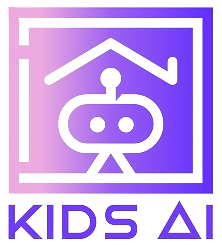In this edition of the KidsAI Interview Series, we explore the insights of Ben Whitaker, a leader in educational technology. As a prominent figure in integrating digital tools into learning environments, Ben shares his experiences and perspectives on the transformative role of AI in education. From personal anecdotes to practical advice, he highlights how AI is reshaping teaching and learning methodologies, emphasizing the importance of ethical guidelines, student well-being, and the need for continuous adaptation in this rapidly evolving field. His knowledge and foresight are invaluable for educators and institutions at the intersection of technology and education.
Welcome to KidsAI, Ben! It’s a pleasure to have you with us. Your journey in education is a testament to the power of innovation. Could you share with us some of the key moments that fueled your passion for empowering young people and transforming education with technology?
My daughter is now 13 years old. She started high school a couple of years ago and in her first year, she was given a history essay assignment with the title “Explain the importance of Edward VIII’s abdication.” A pretty standard homework assignment. She messaged me saying, “I have asked ChatGPT to write me this and here is what it wrote. What do you think?” My first reaction was pride as I had never talked to her about ChatGPT despite it being part and parcel of my job but then I was intrigued. The response was US English, didn’t sound like her at all and was very AI-like, which I told her. She responded with, “Shall I ask it to write it as an English 12 year old?” That astounded me!
The long and short back and forth was that we asked it for spelling mistakes (to fool the teacher, as I was getting playful!) and then to explain some of the key terms such as abdication, divorcee and socialite. She handed the homework in and it was never spotted.
This served to show me that even though I had been in transformative spaces with digital technology for many years, we were at a precipice with AI tools and that students are already using these tools so we have work to do to educate them on safe and proper use, rather than pretending it doesn’t exist.
AI is a transformative force across sectors, especially in education. How do you personally define AI, and what makes it an indispensable tool for the future of learning?
Artificial Intelligence (AI), from my perspective, is a branch of computer science that focuses on creating systems capable of performing tasks that typically require human intelligence. These tasks include learning, problem-solving, pattern recognition, and language understanding. It is an indispensable tool for a few reasons, not least because one size fits all curricula just isn’t cutting it anymore so AI can bring personalisation, accessibility, adaptability, creativity and critical thinking back to the heart of education.
In your consultancy, you’ve been instrumental in integrating GSuite tools in educational settings. Can you recount some success stories where this integration has led to significant improvements in teaching and learning?
Integrating Google for Education tools into educational settings has led to several success stories, highlighting the impact of these tools on learning and teaching (in that order!). Some highlights include:
In a secondary school, the introduction of Google Docs revolutionised group projects and collaborative assignments. Students could simultaneously work on the same document from different locations, facilitating teamwork and communication. Teachers reported a noticeable improvement in the quality of group assignments and observed increased student engagement.
At an FE College, using Google Meet, Chat and Classroom significantly improved communication between staff and students. Tutors were able to hold virtual office hours, increasing their availability to students. Google Classroom served as a central hub for assignments, resources, and feedback, making course management more efficient for educators and more accessible for students.
Google Calendar, Gmail and Tasks were adopted by a MAT to improve organisation and time management. Teachers and administrators used these tools to schedule appointments, timetables and meetings efficiently. The integration of these tools across the MAT led to better coordination and reduced scheduling conflicts.
By utilising Google Forms, a primary school created a more effective system for communicating with parents. Regular surveys and feedback forms helped teachers understand parental concerns and expectations, leading to a more inclusive educational environment. This also allowed for quick and efficient organisation of school events and parents’ evenings + cut down on paperwork for educational visits.
The use of Google Sheets for data analysis in an FE College provided educators and leaders with valuable insights into student performance. They could track progress over time, identify areas needing improvement, and tailor their teaching strategies accordingly. This data-driven approach led to targeted interventions and improved student outcomes.
Your insights are invaluable to our KidsAI community. With AI reshaping educational landscapes, what are the key ethical guidelines you believe institutions should follow to ensure the technology benefits students’ well-being?
Student wellbeing has to be front and centre of any new technology – it is for learners’ benefit first and foremost. I know teachers and administrators will benefit from efficiencies but the tail must not wag the dog! My thoughts would be that the key ethical guidelines would be something like:
Prioritise Privacy: Protect student data vigorously. Institutions should ensure that AI systems safeguard personal information, maintaining confidentiality and security. There are lots of tools that are open-source; we must ensure that students are safeguarded.
Ensure Fairness: AI tools must be designed and implemented to treat all students equitably. Avoid biases that could disadvantage any student group and where they exist, call them out and actively work to address them; don’t ignore them!
Maintain Transparency: Make the workings of AI systems clear to students and educators, as well as parents. Understanding how and why decisions are made by AI is crucial
Seek Consent: Obtain explicit consent from students and parents for the use of AI tools, especially when it involves personal data. Don’t presume – keep communication lines open.
Promote Wellbeing: AI should be used in ways that support students’ mental and emotional well-being, not just academic performance. Spotting behavioural trends, offering bespoke online emotional support (AI Mentors, for example) and sifting out dangerous emails will all help.
It all needs to be underpinned by Continuous Monitoring and Evaluation: Regularly assess the impact of AI tools to ensure they are used ethically and effectively. Is this the right tool for the job? If not, don’t just keep it because we have always used it!
There will be loads more. These are just my thoughts.
As a Google Certified Educator and a leader in ed-tech, what practical advice can you offer to teachers aiming to leverage AI-driven educational tools in their classrooms?
First and foremost, have a play in a safe environment. Go low stakes first. There are loads of great resources out there to find and play – https://aieducator.tools/ or https://www.canopydirectory.com/ are great places to look. My friend and former colleague, Dan Fitzpatrick (he used to be on the Edufuturists podcast with me!), wrote a cracking book too, The AI Classroom – get hold of it and read it!
More practically though: talk to your students about their experiences with it. Do they use Snap.AI? Do they think the TikTok algorithm is working for them? What are their fears in terms of AI in education, particularly around assessment?
On the Edufuturists podcast, you explore a range of forward-thinking topics. Which AI-related trends or technologies do you see as the most promising for transforming the education sector?
On the Edufuturists podcast, we delve into many AI-related trends and technologies with transformative potential for education. Whilst not just about AI, as we focus on the future of learning, we know that AI is likely to be integral to it. Some things we think we are seeing and will continue to see in terms of AI with potential are:
Adaptive Learning Platforms, which use AI to adjust the learning path based on a student’s progress. They can provide personalised resources and challenges tailored to each learner’s needs, making education more effective and engaging.
Natural Language Processing (NLP), which enables machines to understand and respond to human language (as per ChatGPT, Perplexity and Bard/Duet) can revolutionise interactions in educational settings. It can power chatbots for student support, assist in language learning, and facilitate more natural interfaces for educational software.
AI-driven predictive models can analyse student data to forecast learning outcomes and identify students who might need additional support. This proactive approach can help educators intervene early and tailor their teaching strategies.
AI can and is assisting in generating customised learning materials, ensuring content is up-to-date, relevant, and tailored to different learning styles or needs.
Automated systems are taking the legwork out of the biggest challenge that teachers face, other than general workload: marking & feedback. AI can assist in grading assignments and providing instant This not only saves teachers time but also allows students to learn from their mistakes more quickly, which as Dylan William and John Hattie says is one of the most effective elements of formative assessment.
While not exclusively AI, when combined with AI, Augmented and Virtual Reality (AR/VR) can create immersive learning experiences. They can bring abstract concepts to life, making learning more interactive and engaging.





